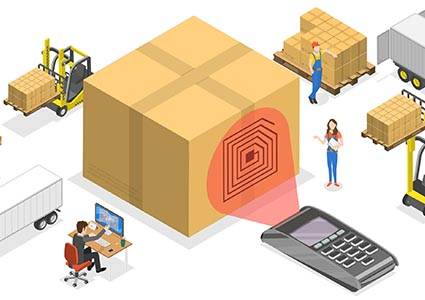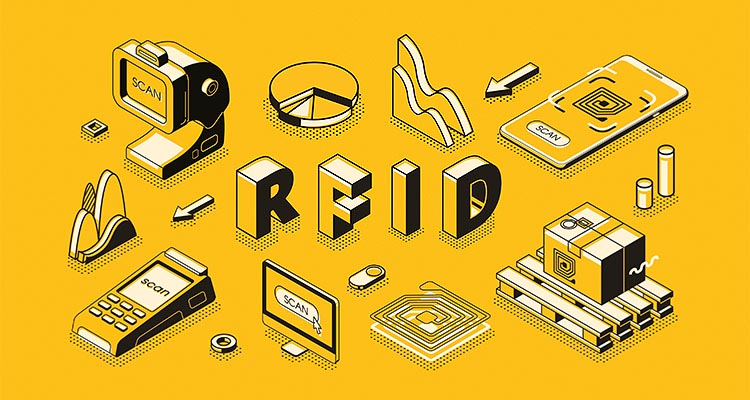Harnessing RFID technology for a greener retail future.
In modern retail, Radio Frequency Identification (RFID) technology has emerged as an important technology to revolutionize how inventory is managed and tracked. But beyond efficiency, RFID is supporting retailers with sustainability practices, offering solutions that promise to lessen environmental impact.
In the last few years, RFID technology has leaped from basic tracking to a sophisticated tool integrated into the larger retail tech revolution. Today, RFID tags are smaller, more cost-effective, and more energy-efficient, making their application widespread from high-end fashion to grocery items.

Some of the latest trends see RFID coupled with IoT (Internet of Things), where items are not only tracked but also intelligently managed through data networks. This integration allows retailers to optimize product life cycles and significantly reduce waste.
RFID technology offers robust tools for sustainability in retail by ensuring products are not overproduced, overstocked, or wasted. By providing precise data on inventory levels and sales patterns, RFID systems help retailers make informed decisions, minimizing excess production and reducing unsold goods disposal.
Major retailers can implement RFID across their supply chain and experience a reduction in carbon emissions whether it’s due to optimized shipping routes or a decrease in frequency of deliveries. RFID helps in implementing reverse logistics, where unsold or returned goods are efficiently routed back to warehouses or recycling centers, further promoting less waste.
The environmental benefits of RFID extend into more nuanced areas of retail operation. For instance, RFID can enhance the management of perishable goods. With precise tracking, retailers can ensure that items such as produce, dairy, and meat are sold while still fresh, reducing spoilage and food waste. This not only conserves resources but also decreases the methane emissions associated with decomposing food in landfills.
For example, a grocery chain could use RFID to implement dynamic pricing models for perishable goods such as baked goods and dairy. By adjusting prices based on product freshness and approaching expiry dates, the retailer can encourage the sale of older inventory before it becomes unsaleable. For instance, a carton of milk nearing its expiry date could be automatically discounted, with the new price instantly updated on digital price tags connected to the RFID system. This real-time price adjustment can be further highlighted through digital displays at the store and mobile app notifications to alert customers of discounts on their favorite products. This approach not only reduces food waste but also offers consumers the benefit of discounted prices, enhancing customer satisfaction.
RFID technology facilitates a more sustainable packaging paradigm. By improving the accuracy of stock levels and sales predictions, retailers can reduce the need for secondary and tertiary packaging layers, which are often used to prevent inventory loss. Reducing packaging not only cuts down on waste but also on the carbon footprint associated with the production and recycling of these materials.
for secondary and tertiary packaging layers, which are often used to prevent inventory loss. Reducing packaging not only cuts down on waste but also on the carbon footprint associated with the production and recycling of these materials.
Another critical aspect is the use of RFID in enhancing customer returns and recycling programs. Retailers can use RFID to track returned items efficiently, sort them, and decide whether they can be resold, repurposed, or recycled, thus supporting a more robust circular economy. This approach not only reduces waste but also promotes resource efficiency by extending the lifecycle of products.
RFID technology is revolutionizing retail management by enhancing inventory precision, which prevents overproduction and minimizes waste. When integrated with IoT, RFID facilitates smarter management of product life cycles, reducing waste while optimizing operational efficiencies. This technology not only helps retailers achieve significant reductions in carbon emissions through optimized shipping routes and improved reverse logistics but also supports the circular economy by efficiently routing returned or unsold goods for recycling or repurposing.
As RFID technology continues to evolve, its integration into sustainable practices within the retail sector is likely to deepen. These innovations promise to further reduce the ecological footprint of retail operations and enhance the sustainability of the industry.
The future of retail is undeniably linked to sustainability. Technologies like RFID are at the forefront of this transformation, offering solutions that improve operational efficiencies while also supporting environmental goals. As retailers continue to embrace these innovations, the promise of a greener, more sustainable retail environment becomes increasingly attainable.
By Sam Vise
Sam Vise is the co-founder and CEO of Optimum Retailing, a scalable, cost-effective retail intelligence platform that multi-unit retailers use to gain the actionable insights needed for better per-store performance.
